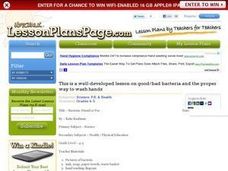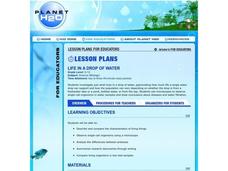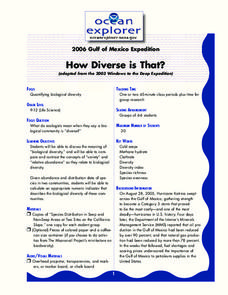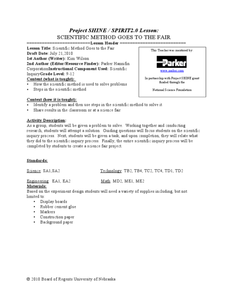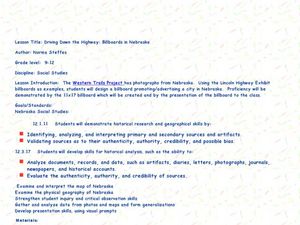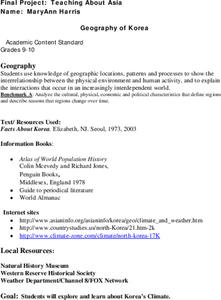Curated OER
Let's Debate - Demonstrating Effective Communication Skills
Students explore and engage in the art of debate. When both sides have been presented each pair have a few minutes to prepare a rebuttal based upon what the opposing side has said. A rubric imbedded in this plan is used as an assessment...
Curated OER
Treasure of the Tar
High schoolers use the Canadian Atlas to discover the natural resources available in various areas of the country. Using the region known as the "Tar Sands", they identify the area's characteristics and develop hypothesis about the...
Curated OER
Modeling Mitosis and Meiosis
Students construct and manipulate models of mitosis and meiosis and compare/contrast them. They create the models using index cards and yarn, interpret diagrams and photographs, and summarize written descriptions.
Curated OER
Bacteria: Friend or Foe?
Young scholars examine a variety of environmental and industrial roles of bacteria. explore where bacteria can be found and distinguish bacteria from other organisms.
Curated OER
Life in a Drop of Water
High schoolers examine the structure, function, and characteristics of microscopic organisms that inhabit freshwater through collection of water samples and observation through microscopes.
Curated OER
What's in a Word?
Students complete a unit on words, their origins, and their usage. They explore various websites, create a word ladder online, develop a list of anagrams, write a story using homonyms, and create a list of vocabulary words.
Curated OER
Policies that Relate to American Indians
Eleventh graders demonstrate an understanding of the impact of the western settlement patterns on American Indians. They analyze the growth and division of the United States from 1820 through 1877 and examine the non-Indian concept of...
Curated OER
Mapping the Middle East
Students examine how the countries of the Middle East were created. They explore the influence of various political and geographic factors in their creation. They list the things they should consider in deciding how to draw new borders...
Curated OER
How Diverse is That?
Students discuss biological diversity in ocean communities. In this diversity lesson, students examine the variety of organisms compared to relative abundance. They will write an analysis and discuss their findings with the class.
Curated OER
Explore More About Bottle Construction
Students explore Green Construction. In this lesson based on the experiences of Peace Corps volunteers, students gain insight into alternative construction in Guatemala. They examine the pros and cons of using alternative building...
Curated OER
Scientific Method Goes to the Fair
Learners use scientific process skills to solve a problem. In this scientific investigation lesson, students investigate a scientific problem, work through the scientific method to form a conclusion. They share their work and findings...
Curated OER
Our Changing Voices
Twelfth graders examine their role in society. They search primary documents and assemble a family album.
Curated OER
Driving Down the Highway: Billboards in Nebraska
Students review photos of billboards from Nebraska highways. Using these billboards as examples, students design a billboard promoting a city in Nebraska.
Curated OER
Women in Science
Students examine obstacles faced by women throughout the world. They gather ask-an-expert websites, propose leading questions, and communicate with real female scientists.
Curated OER
Weather and Climate Lesson Plan
Students distinguish between weather and climate and give examples of weather in their town, and examples of climate in their town.
Curated OER
Rubber Gardens
Students recycle discarded automobile tires and create gardening sites for limited space areas.
Curated OER
Ecosystems
Sixth graders perform various labs, create presentations, and do hands on activities to explore the ecosystem.
Curated OER
the Impact of the U.s. Supreme Court on High School Journalism.
Young scholars study of the First Amendment, Tinker, Hazelwood and the Colorado Student Free Expression Law. They discuss the ramifications on the student press and recite their memorized First Amendment rights. They discover what...
Curated OER
Owl Pellets: A Fowl-Up, Chuck!
Students discover the world of owls as predators. After watching a video of owls hunting and eating, are introduced to owl pellets. Students dissect their own pellet and match the prey's bones to a bone diagram.
Curated OER
Investigating Human Behavior
Students explore the Holocaust and themes such as prejudice and discrimination.
Curated OER
Geography of Korea
Students are introduced to the geography of Korea. Using the internet, they identify the weather and climate in the country and create a week weather chart for Korea's four seasons. They complete an interview with a local weatherman...
Curated OER
GI's, Gals & Gardens
Students, in groups, design a war participation campaign for a specific audience during WWII. They design posters and prepare an oral presentation for the class.
Curated OER
Geologic Time: Relative and Absolute Dating
High schoolers investigate relative and absolute dating; determine the difference between the two dating systems; and apply this knowledge by creating a geologic timetable of their own.





